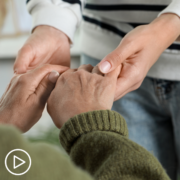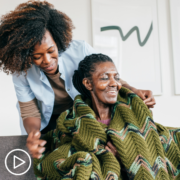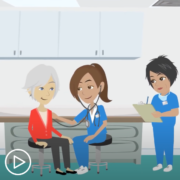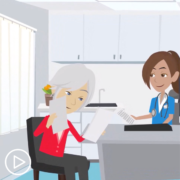START HERE bridges the gap between expert and patient voices, empowering myeloma patients to feel comfortable asking precise questions of their healthcare team.
In this webinar, Dr. Ola Landgren delves into the emerging and exciting therapies and clinical trials for myeloma, discusses the latest options for relapsed disease, and explores the current landscape of managing and monitoring multiple myeloma. Watch as Dr. Landgren answers patient-submitted questions and discusses another hot topic: the utilization of artificial intelligence in multiple myeloma.
Download Guide | Descargar Guía
See More from START HERE Myeloma
Transcript:
Lisa Hatfield:
Hello, and welcome. My name is Lisa Hatfield, your host for this Patient Empowerment Network START HERE program where we bridge the expert and patient voice to enable you and me to feel comfortable asking questions of our healthcare teams. The world is complicated, but understanding your multiple myeloma doesn’t have to be. The goal of this program is to create actionable pathways for getting the most out of myeloma treatment and survivorship.
Today I am honored and really excited to be joined by Dr. Ola Landgren. Dr. Landgren is chief in the Division of Myeloma and the Department of Medicine, and also serves as director of the Sylvester Myeloma Institute at the University of Miami’s Miller School of Medicine. Dr. Landgren, it’s such a pleasure having you today.
Dr. Ola Landgren:
Thank you very much for having me. It’s really a great pleasure to be here today.
Lisa Hatfield:
So in this program, first, we’ll get a high level update from Dr. Landgren on what the latest myeloma news means for you and your family. And then we will launch into some questions that we’ve received from you. Dr. Landgren. We’re at a pivotal moment in the history of multiple myeloma. We’re experiencing an unprecedented wave of progress marked by significant increase in new treatment options and ongoing research. We are very honored to have your expertise to guide us in understanding these advancements and providing clarity around all the evolving landscape of myeloma care.
So before we get started, to you at home, would you please remember to download the program resource guide via the QR code. This is where you’ll find useful information to follow before the program and after. So we are ready to START HERE. Dr. Landgren, can you speak to the emerging and exciting myeloma therapies and trials right now?
Dr. Ola Landgren:
I’ll do my best. There are so many things to talk about, and I don’t think we have 10 hours, so I will have to shorten it. But I would say that the past 12 to 18 months, we have had three new drugs approved in the field of myeloma. These are the bispecific antibodies. The first out of those three was the BCMA-CD3 targeted drug teclistamab-cqyv (Tecvayli). And in the middle of 2023, we had both talquetamab-tgvs (Talvey), and elranatamab-bcmm (Elrexfio) approved. Talquetamab has another target is GPRC5D with CD3. And elranatamab is similar to teclistamab with the BCMA-CD3 targeted bispecific antibody. These are amazing drugs. They have been found in patients that have been heavily pretreated to result in about 60 percent or more percent of patients responding.
So overall response rates ranging from 60 percent to 80 percent in various trials. We have now these drugs approved, they’re still only approved as single drug and there are new trials going, combinations of two of these or these drugs with other drugs such as daratumumab (Darzalex) or IMiDs, such as lenalidomide (Revlimid) or pomalidomide (Pomalyst). So a lot of drug development is ongoing as we speak. We also have the CAR T cells that are reasonably new drugs. We, you think about everything new every week there’s a new drug, but they are very new CAR T cells.
We have had them for about three or so years, three-and-a-half years. And, the two drugs that are approved in that setting is, ide-cel (idecabtagene vicleucel) [Abecma]. That was the first and then cilta-cel (ciltacabtagene autoleucel) [Carvykti], that was the second. They both go after BCMA similar to the two antibodies I mentioned, teclistamab and elranatamab because they are CAR T cells, that indicates that they are cells.
They come from the same person who’s going to receive them back as treatment. So you collect the cells from the blood and you manufacture them into to CAR cells. So chimeric antigen receptor T cells, and then you give them back. There are several new CAR T-cells in development. There are other targets in development, GPRC5D, for example. There are additional other targets and there are also dual targeted cell therapies in development.
There are also allogeneic CAR T cells in development and that means that you could have a product off the shelf. So someone could donate cells, they could be manufactured into CAR T cells, and then you could give them to technically any person, so it doesn’t have to be the same person collecting and then manufacturing, giving them back. So that would shorten the time window for production.
And there are a lot of other details also that are important in this context. The whole manufacturing process that’s currently four to six weeks is being improved. There are some technologies that can make the CAR T cells in 48 hours, but the turnaround time is maybe one to two weeks with all the control steps, but that’s still a huge improvement. And then you have the antibody drug conjugate if you want.
So then you have the belantamab mafodotin (Blenrep). That actually was the first BCMA targeted therapy we had in myeloma. And then the drug was approved on an accelerated approval study. But when the randomized study was completed, it turned out that it was not better than the control arm. The company took it off the market. And now what’s happening is that there are two new trials, and one of them was just reported in the beginning of February of 2024.
The other one was around the ASH meeting in 2023. These two trials show that if you combine it with other drugs, the most recent one was with bortezomib-dexamethasone (Velcade-Decadron), that was superior with the belantamab mafodotin with bortezomib-dexamethasone versus daratumumab with bortezomib-dexamethasone. So I think we will probably see this drug coming back to the myeloma field. It is currently available as compassionate use, so physicians can prescribe it, but these trials will most likely, I would think, lead to FDA approvals with these combinations.
And lastly, I would say that other exciting trials, there are so many trials going on, but another thing that I think is interesting and exciting is also the use of antigens. And you can use mRNA and things like that. So these are like the vaccines. You can either, take a patients’ myeloma cells and look what they have on the surface, you can make more traditional vaccines or you can use more sophisticated newer technologies just like how the COVID vaccines were developed. And you can inject these sequences and then they will translate into spike proteins where the immune system could go after myeloma cells.
We don’t yet have a product like that in the myeloma field, but there are a lot of biotech and groups that are working to see. Moderna, was actually initially a cancer vaccine company and then COVID came and they turned into a COVID company, and now they’re be back again in the cancer field. So that’s a little bit of a summary of a lot of the exciting news that’s out there.
Lisa Hatfield:
Thank you. And do you have any comments about the sequencing of some of these? So with both CAR T and some of the bispecifics approved, obviously if a patient comes in and they need something right away, they’ll take whatever is first available. But all things being equal, if a patient says, well, I can, I have both CAR T accessible and bispecifics accessible. There are some patients out there, I’ve spoken with some who are wondering, is there a benefit to sequencing one before the other, or are there any trials looking into that?
Dr. Ola Landgren:
There are studies that have allowed patients to go on treatment with one of these modalities. For example, the bispecific antibodies with the prior exposure to a CAR T-cell therapy. There are also trials with CAR T-cell therapy that has allowed patients who have been exposed to prior antibodies, either bispecifics or the conjugated antibody drug conjugates, Belantamab mafodotin. So if you look at those studies and see how the numbers compare, if you are not exposed or you are exposed, I think the data is not entirely clear-cut.
There is no definitive study. Some data suggests that maybe it’s not that different, but then there are some studies that suggest that if you go to the antibody first that maybe that would lower the efficacy of the CAR T cell. So some people have for that reason said the CAR T cell should be done first. To make it even more complicated, there are some studies that have then taken time into the equation. So that means that you could have the patient treated with the antibodies for BCMA and CD3, and the antibody is given successfully for a long time, for many years. And eventually, unfortunately, the antibody may stop working.
Now, if you switch back to back to a CAR T-cell therapy without any other therapy in between, some studies indicate that that’s less likely to be beneficial. But if you instead do another target, say you did GPRC5D/CD3, or you did a completely different therapy with small molecules or you did carfilzomib (Kyprolis), or you did venetoclax (Venclexta), or IMiDs, or different types of combinations that are out there, been around for a long time, and you get good mileage out of those combinations.
Now, if that stops working, if you now go to this other therapy, you go back to the CAR T cell, that will suggest that the results are not that different. So I think that there are aspects that we don’t fully understand. I personally believe, based on what I’ve seen, based on what I know from treating thousands of patients with myeloma for almost 30 years I’ve been a doctor, I think time is probably very, very important. So if you go back to back from one therapy to the other, that’s less likely to be beneficial. If you go from one therapy, and it stops working and go to the other drug with the same target.
But I would say it’s not that different from how we think about IMiDs or proteasome inhibitors. If you were to go single drug with a proteasome inhibitor and you switch to single drug with another proteasome inhibitor, or the same thing with an IMiD, that’s less likely to work versus if you went to something else in between. So we just need to generate more data and learn. Lastly, I want to say that in my experience, from all I see in my clinic at the current time, I think the choice that patients make is based on personal preference and to some degree also the situation of the patient. I saw a patient yesterday, 50 years old, who came from another country and has relocated to us here in Miami and asked, what are the options?
And we talked about CAR T cells, we talked about bispecifics. And considering all the different factors that CAR T cell would imply that we had to give some other combination therapy for two or three cycles while we harvest the CAR T cells and manufacture the CAR T cells and then plan for the admission and give it, and also that the patient was not really very happy about the side effects in the hospital with CAR T cell. That patient shows the bispecific, but I’ve also seen other patients in the same situation saying, I’d rather do these different steps for two or three months, I stay in the hospital, and then I enjoy being off therapy.
Actually, I saw another patient just a few days ago, a gentleman in his upper 70s who we had the same conversation, and he had picked the CAR T cells. And I saw him with his wife and he has been off treatment for two years doing excellent. So different patients make different decisions. And I think that is just how the field is evolving. So I think we should be open to individual patient’s priorities and what they want, and we should just offer everything. And of course, we can guide if a patient wants us to give direction, but I think presenting it and let patients be part of the decision-making, that’s the future of how medicine should be practiced.
Lisa Hatfield:
Thank you so much for that explanation. I’m going to segue into a comment that I always make to myeloma patients. As Dr. Landgren was explaining all of these treatment options, he is on top of all the latest and greatest news and therapies. I always recommend to myeloma patients newly diagnosed or otherwise to seek out at least one consult from a specialist. If you have difficulty accessing care, then a lot of places can do video conferencing, but even that one consult to see a myeloma specialist is so important in your care and treatment options. So I’ll just throw that out there, Dr. Landgren, as a myeloma specialist that you are, we appreciate your expertise in explaining that so well.
Dr. Ola Landgren:
I agree 100 percent with what you said, and I would like to add to that and say, going to a specialist center and it doesn’t have to be here, can really really help. It can be a lot of small things. There is data indicating that survival is longer for patients who have access to specialists. That has been published in the Journal of Clinical Oncology. The Mayo Clinic has published that, I think it was more than one year longer survival.
That by itself is, of course, very strong, but I also think that there are a lot of the small things like the different types of pre-medications, the drugs that are given around myeloma drugs. Could you decrease the dose of some of these drugs like the dexamethasone? Could you get rid of Benadryl if you give the antibodies? These may look as small things, but they can make a huge difference for quality of life.
We have a lot of people coming for second opinions, and we always say if you live closer to someone that you trust, you should go back and be treated there. You can always reach out to us. We are happy to be involved. You have us as a backup. We can be your quarterback if you ever need us. I think that is absolutely the best advice for every patient. Go and get feedback and if you’re not sure about the feedback you get, you could always have two different quarterbacks and you could ask them. I don’t think having 10 or 20 is going to help, but having one or two second opinions, I think is a good decision.
Lisa Hatfield:
That’s really helpful information, thank you, Dr. Landgren. So I think we’re going to shift a little bit to managing and monitoring multiple myeloma. Once you’ve had a patient go through the induction therapy, what kind of monitoring do you complete for your myeloma patients and in particular those who have reached a certain level response and are maybe on maintenance or continuous therapy, what type of tests do you do and how often regarding labs, imaging, bone marrow biopsies?
Dr. Ola Landgren:
There are a lot of different ways, obviously, of practicing medicine. So every center has developed models that they feel very comfortable doing. So I like details. I like to know things. I like to check things. I’m not excessive in ordering invasive tests, but I like to know. Also, I like to make sure the patient not only has good long-term clinical outcomes, but also good quality of life. And to me, I try to minimize the intrusiveness of what we do. So, for example, if I give a combination therapy where there is an injection or infusion, say week one, week two, week three, and then there is a week off. I recognize that if you do labs during that week off, you will have a better yield and understanding of how these three different injections or infusions actually have moved the disease forward and suppressed the disease.
But in my mind, I think that week off is a very important week off for the patient. So I would rather do testing the third day of the treatment at the treatment unit. So if it’s week one, week two, week three, I would draw the myeloma labs that same day. And that would give the patient six more days off from injection, infusion that third week and the whole fourth week off. So I would give the patient 13 days off.
Again, these are small things. These are things I’ve thought about a lot. I’ve practiced medicine for many years and I recognize that having time off like that, many patients travel, they go on vacation, they do different things. So I don’t want to just randomly put a blood test in the fourth week just because I want to check after week one, two, three, and then have the assessment.
I sort of underestimate the benefit of the therapy and then I start the next cycle, say back to back cycle two and cycle three and so forth. I would typically do blood tests once a month following these principles. I do baseline and I would do the last day of injection or infusion. For a newly diagnosed patient, you ask me, I would for baseline always do bone marrow biopsy and an aspirate. I would always do a PET-CT for every patient as my default. Sometimes we end up doing MRI. So that could be other things that are happening, but that is what we do for the majority of our patients.
After we have completed four to six cycles of treatment for patients that are candidates for consideration of transplant with chemotherapy with melphalan (Alkeran), we would usually do a biopsy after four to six cycles and we would use that to determine what’s the optimal mobilization protocol for stem cells. When we do that, we would run a MRD test.
We would run our in-house flow cytometry test that we developed when I used to work at Sloan Kettering and we have developed that here in Miami as well. We work closely with Sloan Kettering, and we have set up this assay in collaboration in the new 2.0 version. We will also send the aspirate for the clonoSEQ at Adaptive Biotech, which is the DNA-based sequencing for MRD. We would send the patient for collection of stem cells.
When the patient is back, we will continue treating. So if you say we do it after four cycles, we would collect, if we do it after five or six, then we collect. After that, we would typically resume therapy and for the majority of our patients, we actually give around eight cycles of therapy, and we have seen that you can deepen the response. You don’t increase the toxicity, but you deepen the response for the vast, vast majority of our patients. When we have used our best therapies, we have done it that way…
We have even published on this, over 70 percent of our patients are MRD negative, and many of those patients, when they come to cycle eight, they ask, do I have to do the transplant? And that is a controversial topic. But I think there are two large randomized trials that have shown the same thing, that there is no survival benefit with transplant. But you can also say that there is, in those two trials, a progression free survival benefit, meaning that the disease would stay way longer with transplant.
But many patients say, if I reach MRD-negative, both those two trials show that if you’re MRD-negative without transplant, or you’re MRD-negative with the transplant, PFS was actually the same. And given that there is no survival, overall survival benefit, why would I subject myself to go to that? Why don’t I keep the cells in the freezer and go right to maintenance? And we will have a conversation with every patient, they would meet our transplant team, they would meet our myeloma expert team.
And the individual patient will make decisions. I think over time, more and more patients have chosen to keep the cells in the freezer. For patients that are MRD-positive, we would counsel towards transplant, but there are patients that don’t want to do that, and we are not forcing any patients to do that. We would give patient maintenance, and on some of our trials, we use the standard of care, which is lenalidomide maintenance.
And we are also developing new approaches where we have done daratumumab added once a month with lenalidomide. We have gone one year, and we have started to do two years of that. And after that, we would stop daratumumab and just do lenalidomide maintenance. Lastly, to answer your question fully here, we would do a PET-CT in the bone marrow after the eight cycles as a repeat, and we would offer a patient to check on maintenance on an annual basis, and this is in accord with the NCCN guidelines. So a lot of details here, but you asked me how we do testing.
Lisa Hatfield:
Yes. And one of the questions that comes up, too, regarding bone marrow biopsy, so you talked about patients kind of through the process of myeloma treatment, perhaps they’ve reached a point where they’re going to be for a while. Do you see a need for continued bone marrow biopsy, say, annually, or is there some benefit to using the newer tests that are being investigated, like mass spec testing and some of the newer ones, I think the EuroFlow? Do you think that that can be used to test for bone marrow biopsy? And how will that be used to monitor the myeloma if a patient is doing relatively well, or do you still like to do bone marrow biopsies on a regular basis? And I know every specialist is different in how they’ll answer that question.
Dr. Ola Landgren:
So what’s known in the literature is that there is no study that definitively has compared annual biopsies with these blood-based tests that you mentioned, showing that they can replace the bone marrow. Those tests or those studies have not yet been published and shown in a convincing way that we have done. This is how it is. It’s still an open question. We don’t know the answer for sure. So our take has been to offer patients to repeat it on an annual basis for maybe two or three and sometimes up to five years. I don’t think we would do biopsies every year for five, 10, 15 or more years. At some point, you have to ask yourself, what are we trying to chase here?
But I think the data we’re looking at that we have published on this and others have also show that if you are MRD-negative after completion of the eight cycles with or without the transplant, the patient that are MRD-negative one year later, they are more likely to be free from progression 10 years later, compared to the ones where you only check once and you don’t know what happened one year later. And that is frankly because there is a small group of patients where MRD-negative could bounce back into positive.
So to check after completion after eight cycles and to check after one more year on maintenance, I think gives us more confidence in thinking about if we eventually could step down and maybe even stop the maintenance at the long term. There is no study that definitively has proven that, but the data suggests that being negative after eight and do another year and even if you do two years out, those are very strong indicators that the disease will stay away long term.
So that’s our justification for offering it, but we would never force any patient. And I also want to say that we have thought about for a long time, how we can contribute to the field and how we can advance the field for blood-based tests. So we are here in Miami, developing a lot of these technologies, and I have made a promise that we will make all these available for all patients that come here to Miami as part of our standard workup. Because they are not clinically validated tests, they will have to be reported for now as research tests, but we will share the information with individual patients.
So we have three different platforms for now. And we are working on the fourth one. So one of them is the mass spec with MALDI, where we can screen the blood with lasers. And we can increase the sensitivity by maybe hundred times compared to existing immunofixation assays. The second is something called clonotypic peptides, which is a more sophisticated way to run mass spec, which is probably up to thousand times more sensitive than immunofixation. And the third technology we are doing or setting up right now is circulating cells that we sequence.
And this is the Menarini technology that is approved for certain other solid tumors. I think for GI malignancies, it’s FDA cleared, but we are doing it in myeloma. We are also looking for free circulating DNA. We’re working with New York Genome Center to set those types of assays up. So my thinking is, if we can offer every patient that come here to do it, and many of those patients will do an annual biopsy, we actually will have the database that can answer the question you asked me, if it can replace. There is no other way that this can ever be answered.
But having a large database, we actually can compare on a patient level, how the bone marrow biopsy with flow cytometry and sequencing, how that behaves in relation to the blood base. How does it perform? Is any of these better? Can they replace each other? So I think if we do this for one or two years, we will have the answer to the question. That’s why I want to do it.
Lisa Hatifeld:
So that kind of leads to the next question that is really an exciting area. I know it’s not necessarily new, but newer is artificial intelligence. And I know I was reading an article about one of, that you and your colleagues have worked on a newer project and I don’t know if you pronounce it IRMMa or not, but using these large databases to help predict I think, it’s the response of treatment in some patients. So can you talk about that a little bit and tell us about that development and what developments are exciting with artificial intelligence in cancer, in particular myeloma?
Dr. Ola Landgren:
Yeah. So you mentioned the study we just published. We published a model that we call IRMMa and that stands for individual risk prediction for patients with multiple myeloma. So what we were thinking was at the current time, all the existing models are pretty much providing the average patient’s predicted outcome. So think about it is like it’s a probability measure. So you say, if I take this about therapy, what’s the predicted average outcome for patients that take this therapy, say, five years later? So on average, say 70 percent of patients are free from progression. That sounds pretty good. The problem is that you don’t know if you are in the group, 70 percent group that didn’t progress or if you’re in the 30 percent that did progress.
So where are you as an individual? So it’s almost like looking at the weather app on your phone. If it says it’s a 70 percent probability of sunshine and then you go outside and it’s raining, it’s because it didn’t say that it’s 100 percent probability of sunshine. So if you think about another situation would be, say, in a GYN clinic, if a woman were to come and ask the doctor, am I pregnant? Yes or no? You couldn’t say it’s 70 percent probability. You would say, yes, you’re pregnant or not pregnant.
So for myeloma, we have for a long time been living in these weather report systems where we say 70 percent or 30 percent. And we want to go in the other direction of the pregnancy test, where we actually can say for someone with this particular disease profile, with this treatment, this is where this is going to take us. We worked on this project for almost four years and we worked with a lot of other groups around the world that have a lot of data. And they have graciously agreed to collaborate with us and share their data sets. The beauty with this collaboration, there are many beauties of it, but one of them is that people don’t treat patients the same way.
And that actually has allowed us to say for patients that have a particular biological or genomic makeup, if you’re treated this way or that way or the other way or a fourth way and so forth, which of these different treatments would make patients have the longest progression and overall survival? So if you have a large database, you can actually ask those questions. So you can say that you profile individual patients in full detail and you put them in detailed buckets instead of grouping everybody together.
And now if you add a new case, if a new patient is being added and you say, which bucket would this individual fit? Well, this is the right biological bucket. You can then use this database to say out of all the different treatment options, which treatment option would last the longest, which would give the best overall survival? Other questions you could ask is also, for example, you have a patient with a certain biological workup or makeup. And you say, if I treat with these drugs, will the addition of, say, transplant, will that prolong progression for his survival?
And you can go into the database and the computer will then say, I have these many patients that have this genomic makeup and these many people that were treated with this treatment with transplant versus the same treatment without transplant. There was no difference in their progression or overall survival. So then the computer would say, it doesn’t add any clinical benefit, but there could be another makeup where the answer is opposite, but transplant actually would provide longer progression for his survival. I think the whole field of medicine is probably going to go more and more in this direction. So what we want to do is to expand the number of cases.
So we are asking other groups around the world, if they have data sets with thousands of patients, they could be added to this database and we could then have more and more detailed information on sub types of disease and more and more treatment. So it will be better as we train it with larger data sets. The model is built as an open interface so we can import new data. And that’s also important because the treatments will continue to change. So we, for example, say I have a patient that has this genetic makeup. I was thinking of using a bispecific antibody for the newly diagnosed setting.
How is that going to work? The computer will say, I don’t know, because we don’t have any patients like that in the database because that’s not the data, type of data that currently exists from larger studies. But let’s say in the future, if there were datasets like that, you could ask the computer and the computer will tell you what the database finds as the answer. But if you go for another combination, if that’s in the database, it would answer that too. That is where I think the field is going.
And lastly, I would say we are also using these types of technologies to evaluate the biopsies, the material. We work with the HealthTree Foundation on a large project where we are trying to use computational models to get out a lot of the biological data out of the biopsies and also to predict outcomes. So I think artificial intelligence is going to come in so many different areas in the myeloma field and probably in many, many other fields in medicine.
Lisa Hatfield:
Thank you so much, Dr. Landgren, for that broad overview of myeloma, especially relapsed and refractory myeloma. So it’s that time now where we answer questions we’ve received from you. Please remember that this is not a substitute for medical care. Always consult with your medical team. And we’re going to jump right into some questions that we’ve received from patients, Dr. Landgren, if you have a little bit of time to answer these questions for us.
Dr. Ola Landgren:
Of course.
Lisa Hatfield:
Okay. So broad questions. We try to make them broad so they apply to most people, but this patient is asking Dr. Landgren, what are the key biological processes driving disease, progression and evolution of multiple myeloma, and how can we target these processes to prevent disease relapse and improve long-term outcome?
Dr. Ola Landgren:
So that’s a very good question. So I think in a nutshell if you use genomics, which refers to the genetic changes that you can see in the plasma cells, there are certain features that the myeloma cells have. They have the copy number changes, that’s the gains and losses of chromosomes. You can find these if you do FISH and cytogenetics could be, for example, gain of chromosome 5 or gain of chromosome 7 or gain of chromosome 11. That would be part of the Hyperdiploidy disease, or you have loss of chromosome 13 or 13q deletions. We also refer to 17p deletion. These are copy number changes, they’re extra or loss of these chromosomes. But then you have also the structural variance where you have the translocations of chromosome 14, chromosome 14 harbors the IGH locus, which regulates the making of immunoglobulins.
Plasma cells make immunoglobulins. For reasons that are not entirely clear. The translocations in myeloma that include IgH, they are partnering up with oncogenes. There is a list of oncogenes, there’s MATH, there’s three MATHs, A, B, C. There’s FGFR3, MMSET, and there’s also Cyclin D1 that are on the list. So these are the different types of structural variants that you can see with FISH probes.
What people have understood less about are something called mutational signatures. And myeloma is made up by eight distinct mutational signatures that you can see in every single patient. And what that means is that you can, if you conduct whole genome sequencing and you look at all the base pairs, you can see there are certain number of combinations. C can be swapped for A and C can be swapped for G or C can be swapped for T, T can be A and T can be C and T can also be G.
Those are the combinations. So there are four different base pairs, but if you, because the DNA is double stranded, these are the only possibilities that mathematically that you can see. Now if you look for every base pair and you look on one base pair on the left and one on the right, we call that 5 and 3 prime, you look through triplicates, every of these base pairs can have these different swaps I mentioned. Mathematically, there are 96 different combinations that you can come up with. That’s it.
If you don’t go through the entire genome from left to right, you see that there are these recurrent eight signatures that are there in every patient. So although we don’t understand why they are and exactly how they function, the fact that you see them in every patient tells us that this has to have something to do with the biology of the disease. It must have a role in the control of the disease. We are starting to see that there is one signature that’s called APOBEC. That signature seems to be very important for resistance to treatments. And you can see that APOBEC can be more or less expressed.
And if APOBEC is very expressed, we see that there are lot of mutations in the cells. We have seen in patients with the chemotherapy that APOBEC can be very expressed. When we treat with four drug combinations, it can be very expressed. And what I’m saying, when I say it can be expressed, these are in the patients that relapse out of these therapies. We have also seen that in CAR T cells and bispecifics. So that makes me believe and our group believe that the cells use some form of what we call tumor intrinsic defense mechanism to protect themselves from whatever therapy we use.
It doesn’t matter if it’s immunotherapy, chemotherapy or small molecule therapy, there are some fundamental programs the cells can turn on. We need to understand that better and we are spending a lot of time trying to drill into this.
Lastly, I also want to say there was a fourth class of genomic events called complex events that you can see in myeloma, something called chromothripsis. That’s a very severe genomic lesion, is a ripple effect through the genome. There are a lot of havoc going on. And the first time we saw that, we thought this has to be something wrong with this sample. But when we look through more and more samples, we see that about a quarter of the patients actually have this chromothripsis.
So the bottom line is, it’s time to stop doing FISH, it’s time to do more advanced sequencing, ideally whole genome sequencing, but a step towards a whole genome could be to do whole exome sequencing. But there are companies saying that you can do whole genome sequencing for $1 in the future. So that’s really what needs to happen. We need to have better tools to better understand and then we can use this to better understand how to differentiate the therapy and have an individualized treatment. That’s what I talked about with the IRMA model.
Lisa Hatfield:
All right, well, thank you so much for that explanation. Dr. Landgren, can you speak to the advantages that bispecific antibodies offer over traditional therapies and how do you see their role in overcoming treatment resistance?
Dr. Ola Landgren:
Well, the bispecific antibodies is a novel way of engaging the immune system to go after the myeloma. So if you think about the other antibodies we have, we have three other antibodies. We have daratumumab, we have isatuximab (Sarclisa), we have elotuzumab (Empliciti), they are naked antibodies. They bind to the myeloma and on the backend of these antibodies, there is something called the FC receptor that attracts cells, NK cells, for example, also T cells, and they also attract, some of these antibodies also attract complement and they also by themselves send what’s called a death signal into the myeloma cell.
The bispecific antibodies are very different. They bind and they don’t send death signals, they don’t engage with the complement. What they do is that they have another arm sticking out that binds to the T cells. That’s a CD3 arm and there’s an open pocket. So when a T cell passes by, it grabs the T cell. And now you have a T cell linked to the antibody sitting next to the myeloma cell and the T cell will kill the myeloma. T cells can be very aggressive and kill the myeloma. You just hold them together, it’s like a matchmaker.
And if you think about how CAR T-cell therapy is designed, you take out the T cells, you manufacture them to have a special antenna receptor on their surface, and then you give them back again. And then they bind, this receptor binds to myeloma cells. So in the setting of a CAR T-cell therapy, the T-cell sits next to the myeloma cell, but that’s because the T cells were taken out of the body, manufactured to have this receptor that then finds the myeloma cell. But the bispecific antibody, that they don’t require the T cells to be taken out, to be modified this way.
You just use your existing T-cells in your body and these antibody just binds to the T cells and the myeloma cells in the body. So it’s sort of a little bit mimics what the CAR T cells do, but it does it in its own way within the cell, within the tissue in the body. You asked me for resistance mechanism and how they are better. Well, I think the best answer I can give you is to say that the overall response rate for the bispecific antibodies are very high. They are 60 to 80 percent single drug compared to the current trials. And if you look and see the trials that have led to approval for the other existing drugs, they were 20 or 30 percent.
So the overall response rate is much higher for the bispecifics than they were for the other existing drugs. We don’t really know exactly how to use them, I would say. What’s the optimal dosing schedule? We give them weekly, it may be every other week, and maybe monthly, eventually, I would think. And should they be combined with which drugs? That’s ongoing investigation. Other questions are, can they be stopped? Can you monitor patients off therapy for a long time? Will some patients never have the disease coming back? We hope so, but we don’t know. Or would it be patients could be off therapy for a long time, like with CAR T cell? Could that happen with the bispecifics? It’s possible.
And if you were to monitor with blood-based tests and you see that there is reappearing disease, would you then put patients back on the therapy? These are questions we…there are a lot of questions, we don’t have answers to all these, but that’s where I think the field is going. A lot of people, including us, are trying to investigate this.
Lisa Hatfield:
Okay, thank you. And we have a number of questions about MRD testing, so I’m going to try to combine those all together. Basically, what the questions are asking is how do you interpret MRD testing with regard to prognosis, treatment response, and maybe even like treatment, ongoing treatment? How do you use those results in your clinic or any comments you might have on the MRD test?
Dr. Ola Landgren:
So MRD tests have been around for quite some time. We have been pioneers pushing it. We have worked on it for over 15 years. We worked with the FDA to see if MRD could eventually become an endpoint for drug approval, that’s work in progress. The FDA will make those decisions. There are a lot of trials that use MRD as a secondary endpoint to see how it correlates with progression-free survival. And there actually are some trials that have been using it as a cool primary or primary endpoint in the absence of FDA’s decision to accept it. But that is probably going to change in the future. We will see. What have we done in the clinic? Well, we have used it in the same way as we have done with PET-CTs and the regular blood work. So if you use SPEP IFE light chains and you see there is residual disease after you have delivered your planned treatment, people have used what’s called consolidation therapy.
So we have done the same with the MRD test. If there is someone who has a little bit of disease left, we have tried to see if we could make that patient MRD-negative. We have also used it as a tool to build more reassurance. I mentioned before for patients who get this new combination therapies, if they are not very keen on jumping right to chemotherapy with Melphalan and transplant, if they want to collect the cells and keep them in the freezer, using the MRD as a tool to guide for reassurance.
Looking at the randomized trial showing that MRD negativity with or without transplant seems to have the same progression-free survival and in the absence of overall survival, either way, that has been published. But we would always say to patients, there are no definitive studies that have shown that this is how it is. It’s still an area of investigation. So if a patient wants to sort of do everything by the traditional book, we would give every step in the therapy and not pay attention. But a lot of patients say, I would rather monitor, and if I have to do these more toxic therapies, I wouldn’t do it. But I will use MRD to build confidence in myself.
Lisa Hatfield:
Well, thank you so much, Dr. Landgren, these have been great questions, and I actually have another half sheet of questions that we don’t have time for, because that’s all the time that we have. Dr. Landgren, thank you so much, it’s been a pleasure talking with you today. So thank you for joining our Patient Empowerment Network START HERE program. This has been an excellent discussion. Thanks to all of you, for your questions and tuning in. My name is Lisa Hatfield. I’ll see you next time.
Dr. Ola Landgren:
Thank you very much for having me. Thank you.




















